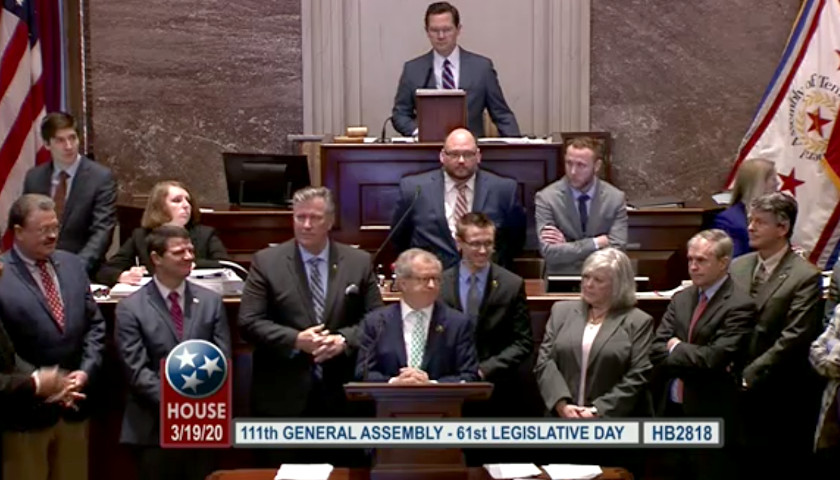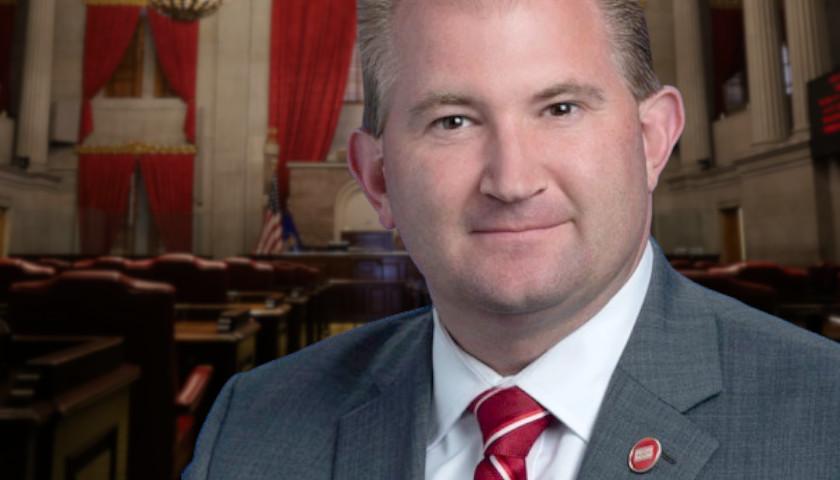Tennessee’s lawmakers worked all day and well into the evening Thursday to approve a budget for fiscal year 2021 before adjourning for a recess that will go until June 1, 2020.
The amended budget, received from the governor’s office on Wednesday, lowered the growth rate of the current fiscal year from 3.75 to 2.5 percent as the basis, and then projected a 0.25 percent growth rate for the upcoming fiscal year instead of the 3.1 percent originally included in Governor Lee’s February budget, as The Tennessee Star reported.
The amended budget will fully fund: the BEP (Basic Education Program) formula for K-12; higher education outcomes-based funding formula; pension contributions; OPEB (Other Post- Employment Benefits) liability contribution; inflation growth in TennCare; and DCS (Department of Children’s Services) growth in services.
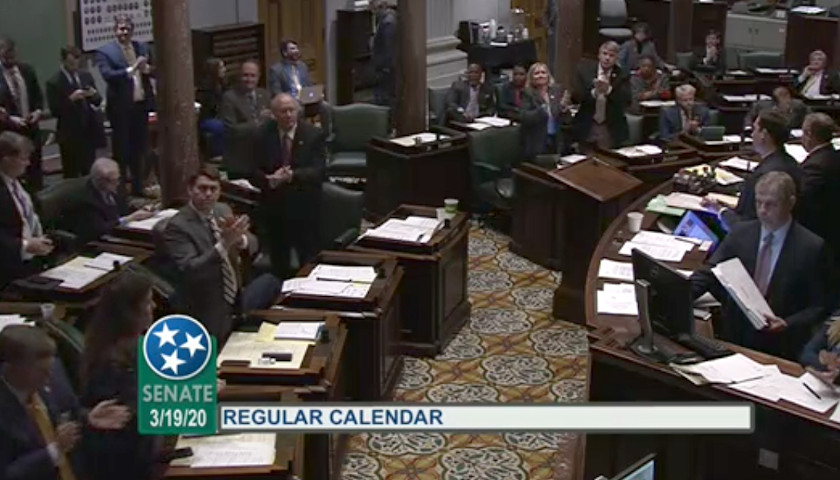
Additional funding will be provided to address capital maintenance projects in state government and higher education.
To address the tornado disaster and coronavirus there are increases to the TEMA disaster relief fund; repair of state buildings; double grants to cities and counties from the planned $100 million to $200 million, which is a safety net for mental and primary care health; the rainy day fund of $300 million over the $50 million planned.
State employees are set to get a 1.5 percent pay increase, reduced from the original 2.5 percent, and teachers will receive a two percent pay increase down from the original four percent, even as unemployment claims in Tennessee within the private sector have skyrocketed, The Star reported.
The budget legislation comes in the form of four separate bills: annual appropriations; bond issuance; addressing Article II, Section 24 of the Tennessee Constitution authorizing state spending to exceed the growth in the state’s economy, otherwise known as the Copeland Cap; and any statutory revisions in order to enact the annual appropriations bill.
In an unusual move, the governor joined both chambers in the observation galleries when they respectively took up the proverbial meat of the budget in HB2821.
The House, with a scheduled start time of 7 p.m., which actually ended up being a little after 7:30 p.m., took up the budget legislation first, with the Senate having a floor session scheduled for 8 p.m.
The discussion on the House floor was much more lively as Democrat members, significantly in the minority holding only 26 of the 99 seats, proposed seven different timely-filed amendments.
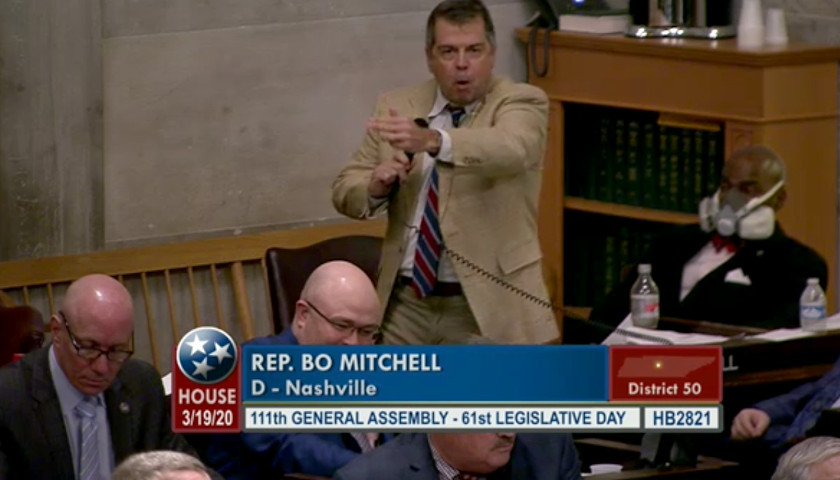
The Democrat amendments tried to reallocate the $41 million in Education Savings Accounts funding that makes the Metro Davidson and Shelby County school districts whole, the expansion of Tennessee’s Medicaid program known as TennCare, allowing across-the-board absentee ballots for the upcoming elections, diverting funds from chronic wasting disease testing in deer to coronavirus testing, a relief fund for employees whose hours have been cut, and waiving sales and liquor-by-the drink taxes for the hospitality sector during the months of April, May and June.
All of the Democrat amendments were met with Republican motions to “lay on the table,” which was achieved across the board through largely party-line votes.
In her introduction of the appropriations bill, Chair of the House Finance, Ways and Means Committee Susan Lynn, said Lee’s original budget proposal was “truly a wonderful budget” and “truly our governor’s heart,” as she looked up to him in the gallery. With the tough economic times, the budget will have to be changed considerably, which Representative Lynn said “grieves me.”
As she acknowledged that she didn’t ever remember seeing a governor being with them during the passage of a budget, there was polite applause from the House floor.
After continued, often passionate discussion, sometimes directed toward the governor, the appropriations bill was finally voted on about two hours later, passing with a vote of 87 Ayes and 3 Noes.
About that same time, the Senate, which had been in recess waiting on the House, took up the appropriations bill by substituting and conforming SB2466 to HB2821.
Lee joined the Senate in the gallery for that discussion, which resulted in a unanimous vote of 29 to 0 in favor of the legislation.
HB2819, approved by a vote of 89 to 1 in the House and a unanimous 29 ayes in the Senate, recognizes that the appropriations from the current 2019-2020 fiscal year may exceed the estimated growth in the state’s economy by $629 million or 3.6 percent. The Tennessee General Assembly is required to approve the limitation in growth in a separate bill, per Article II, Section 24 of the Tennessee Constitution also known as the Copeland Cap for its sponsor, former State Representative David Copeland of Ooltewah.
Tennessee every year puts forward a bill to issue and sell general obligations bond for the purposes of large contracted transportation projects. Although approved in HB2820, none are intended to be sold in the upcoming 2021 fiscal year.
The statutory changes included and approved in HB2822 redirects various fines and fees within TBI necessary to implement the budget.
After the passage of the appropriations bill in the House, Speaker Pro Tem Bill Dunn (R-Knoxville) the longest-serving Republican member in the Tennessee House who announced last September he would not run for re-election in 2020, took over at the dais.
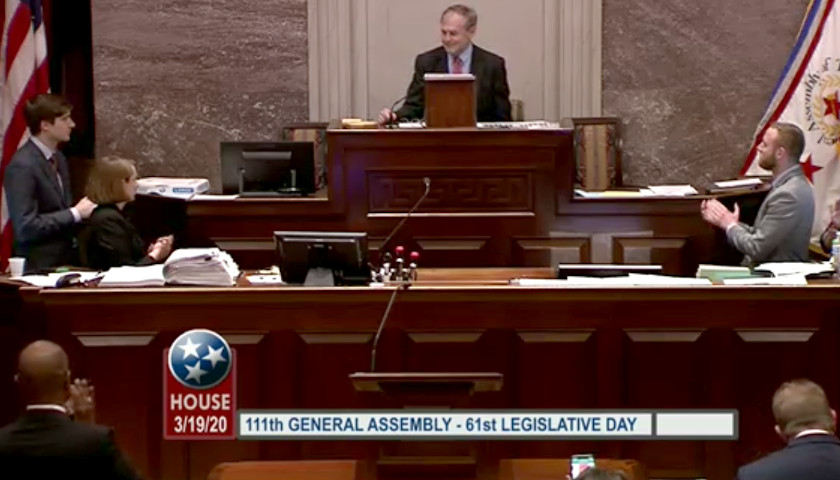
Once the three other budget-related bills were passed, Representative Jason Zachary (R-Knoxville) sought recognition. Looking somewhat emotional, Zachary said, “Speaker Dunn, as your friend and colleague from Knox County, sir, I want to thank you.”
“I want to thank you for being a mentor. Thank you for your service to our great state,” he continued as House members stood and started to clap while Zachary spoke further.
“Sir, you have left our great state better than when you came in,” as the applause and cheers got louder and fellow Knox County Representative Rick Staples came to stand behind Zachary, “on behalf of the General Assembly, on behalf of the state of Tennessee, thank you for your service to our great state, Speaker Pro Tem Dunn.”
Applause continued for the better part of a minute, when Speaker Pro Tem cracked a joke and recognized Patsy Hazlewood (R-Signal Mountain) who reminded and strongly encouraged Speaker Pro Tem Dunn that it is not too late to file for re-election.
With an incredulous look, Dunn quipped, “After tonight?”
After passing an additional consent calendar, the House waited for the Senate to finish their business of the budget bills.
Interestingly, bills among those on the fast track this week perceived to have great importance relative to funding or the current coronavirus situation were not passed before recessing.
HB2815 and companion SB2897 carried by Representative Chris Todd (R-Madison County) and Senator Paul Bailey (R-Cookeville) would allow city and county governments to meet remotely in times of declared state emergencies.
The House and Senate had different amendments that could not be reconciled.
Tennessee Coalition for Open Government Executive Director Deborah Fisher, who had been working on and paying careful attention to the proposed legislation, explained the background and outcome of the failed measure.
HB2255 / SB2188, which seeks to address provisions in Tennessee’s Billboard Regulation and Control Act of 1972 ruled unconstitutional, saw three revisions by House sponsor Representative Dan Howell (R-Georgetown) since the bill passed out of the House Transportation Committee last week. Not addressing the provisions in Tennessee’s Billboard Regulation and Control Act puts no regulations on so-called off-premises billboards and reportedly jeopardizes 10 percent of federal highway funds, estimated at $93 million.
The omnibus bill for premier-type tourist resorts, HB1930 / SB2492, which would result in an increase of about $300,000 in annual state revenues and $221,200 in annual local revenues related to alcohol-related sales, passed the Senate Wednesday, but was not taken up by the House.
In addition to other bills The Star reported the House and Senate was considering this week where “flow motion” was employed to waive normal timing requirements, among other rules, to expedite the process, SJR836 was also considered and passed.
SJR836 by Senator Janice Bowling (R-Tullahoma) increases the 911 emergency surcharge collected from communications service dealers from the $1.16 to $1.50.
The 30 percent increase, which will go into effect January 1, 2021, will increase state revenues to the 911 Emergency Communications Fund by $12.5 million in the half fiscal year of 2021, and $25 million in subsequent years.
By state law, communications services dealers are able to retain 2 percent of the collections on 911 surcharges.
As the Senate wrapped up their business, they rather unceremoniously passed HJR1044 sponsored by House Majority Leader William Lamberth (R-Portland) calling for the General Assembly to recess from the close of business Thursday, March 19, 2020, until June 1, 2020.
Lt. Governor Randy McNally (R-Oak Ridge) upon adjournment said simply, “Yall be safe out there.”
The House, in contrast, had a feeling almost as if they were adjourning sine die, rather than for a little over two months.
House Republican Caucus Chair Jeremy Faison (R-Cosby) recognized the many behind-the-scenes people, without whom they could not have gotten through their work this week.
He also expressed appreciation for House Speaker Cameron Sexton (R-Crossville), “who came in his first time with unprecedented, uncharted waters and territory, and he’s done a phenomenal job this week. He’s lead this House, he’s lead each one of us, and he’s been incredibly fair this entire year.”
Sexton expressed his appreciation for the efforts this week.
“We laughed, some people cried, we fought, we laughed again, at the end of the day, when we leave here, we still remain friends and colleagues, even though we did all those things already. Thank you for allowing me to be your Speaker for this short period of time. As we continue to move forward, look forward to seeing you all very soon again if not before then.”
With that, Sexton turned the dais over again to Speaker Pro Tem Dunn who recognized Leader Lamberth for the adjournment.
In keeping with the normal Tennessee General Assembly schedules, the Senate stands in adjournment until 4:30 p.m., Monday, June 1, 2020, and the House stands in adjournment until 5:00 p.m., Monday, June 1, 2020.
– – –
Laura Baigert is a senior reporter at The Tennessee Star.

